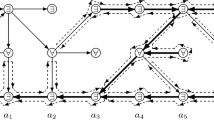Abstract
In this paper, we revisit constructions from the literature that translate alternating automata into language-equivalent nondeterministic automata. Such constructions are of practical interest in finite-state model checking, since formulas of widely used linear-time temporal logics with future and past operators can directly be translated into alternating automata. We present a construction scheme that can be instantiated for different automata classes to translate alternating automata into language-equivalent nondeterministic automata. The scheme emphasizes the core ingredient of previously proposed alternation-elimination constructions, namely, a reduction to the problem of complementing nondeterministic automata. Furthermore, we clarify and improve previously proposed constructions for different classes of alternating automata by recasting them as instances of our construction scheme. Finally, we present new complementation constructions for 2-way nondeterministic automata from which we then obtain novel alternation-elimination constructions.
Supported by the Swiss National Science Foundation (SNF).
Due to space limitations, some proofs have been omitted. These can be found in an extended version of the paper, which is available from the authors’ webpages.
Preview
Unable to display preview. Download preview PDF.
Similar content being viewed by others
References
IEEE standard for property specification language (PSL). IEEE Std. 1850TM (October 2005)
Banieqbal, B., Barringer, H.: Temporal logic with fixed points. In: Banieqbal, B., Pnueli, A., Barringer, H. (eds.) Temporal Logic in Specification. LNCS, vol. 398. Springer, Heidelberg (1989)
Bloem, R., Cimatti, A., Pill, I., Roveri, M.: Symbolic implementation of alternating automata. Int. J. Found. Comput. Sci. 18 (2007)
Boigelot, B., Jodogne, S., Wolper, P.: An effective decision procedure for linear arithmetic over the integers and reals. ACM Trans. Comput. Log. 6 (2005)
Bustan, D., Fisman, D., Havlicek, J.: Automata construction for PSL, tech. report, Computer Science and Applied Mathematics, The Weizmann Institute of Science, Israel (2005)
Chang, E., Manna, Z., Pnueli, A.: The safety-progress classification. In: Logic and Algebra of Specifications. NATO ASI Series (1993)
Dax, C., Hofmann, M., Lange, M.: A proof system for the linear time μ-calculus. In: Proc. of FSTTCS 2006. LNCS, vol. 4437 (2006)
Emerson, E., Jutla, C.: Tree automata, mu-calculus and determinacy (extended abstract). In: Proc. of FOCS 1991 (1991)
Etessami, K., Wilke, T., Schuller, R.: Fair simulation relations, parity games, and state space reduction for Büchi automata. SIAM J. Comput. 34 (2005)
Fritz, C., Wilke, T.: Simulation relations for alternating Büchi automata. Theoret. Comput. Sci. 338 (2005)
Gastin, P., Oddoux, D.: Fast LTL to Büchi automata translation. In: Berry, G., Comon, H., Finkel, A. (eds.) CAV 2001. LNCS, vol. 2102, p. 53. Springer, Heidelberg (2001)
Gastin, P., Oddoux, D.: LTL with past and two-way very-weak alternating automata. In: Rovan, B., Vojtáš, P. (eds.) MFCS 2003. LNCS, vol. 2747, pp. 439–448. Springer, Heidelberg (2003)
Gerth, R., Peled, D., Vardi, M., Wolper, P.: Simple on-the-fly automatic verification of linear temporal logic. In: Proc. of PSTV 1995. IFIP Conf. Proc., vol. 38 (1996)
Jutla, C.: Determinization and memoryless winning strategies. Inf. Comput. 133 (1997)
Kupferman, O., Piterman, N., Vardi, M.: Extended temporal logic revisited. In: Larsen, K.G., Nielsen, M. (eds.) CONCUR 2001. LNCS, vol. 2154, p. 519. Springer, Heidelberg (2001)
Kupferman, O., Vardi, M.: Weak alternating automata and tree automata emptiness. In: Proc. of STOC 1998 (1998)
Kupferman, O., Vardi, M.: Weak alternating automata are not that weak. ACM Trans. Comput. Log. 2 (2001)
Kupferman, O., Vardi, M.: Complementation constructions for nondeterministic automata on infinite words. In: Halbwachs, N., Zuck, L.D. (eds.) TACAS 2005. LNCS, vol. 3440, pp. 206–221. Springer, Heidelberg (2005)
Lange, M., Stirling, C.: Focus games for satisfiability and completeness of temporal logic. In: Proc. of LICS 2001 (2001)
Löding, C.: Methods for the transformation of omega-automata: Complexity and connection to second order logic, master’s thesis, University of Kiel, Germany (1998)
Löding, C., Thomas, W.: Alternating automata and logics over infinite words. In: Watanabe, O., Hagiya, M., Ito, T., van Leeuwen, J., Mosses, P.D. (eds.) TCS 2000. LNCS, vol. 1872. Springer, Heidelberg (2000)
Miyano, S., Hayashi, T.: Alternating finite automata on ω-words. Theoret. Comput. Sci. 32 (1984)
Muller, D., Saoudi, A., Schupp, P.: Alternating automata, the weak monadic theory of trees and its complexity. Theoret. Comput. Sci. 97 (1992)
Muller, D., Schupp, P.: Alternating automata on infinite trees. Theoret. Comput. Sci. 54 (1987)
Muller, D., Schupp, P.: Simulating alternating tree automata by nondeterministic automata: New results and new proofs of the theorems of Rabin, McNaughton and Safra. Theoret. Comput. Sci. 141 (1995)
Pnueli, A.: The temporal logic of programs. In: Proc. of FOCS 1977 (1977)
Rohde, G.: Alternating automata and the temporal logic of ordinals, PhD thesis, University of Illinois at Urbana-Champaign, Champaign, IL, USA (1997)
Vardi, M.: A temporal fixpoint calculus. In: Proc. of POPL 1988 (1988)
Vardi, M.: A note on the reduction of two-way automata to one-way automata. Inform. Process. Lett. 30 (1989)
Vardi, M.: Reasoning about the past with two-way automata. In: Larsen, K.G., Skyum, S., Winskel, G. (eds.) ICALP 1998. LNCS, vol. 1443. Springer, Heidelberg (1998)
Vardi, M.: Automata-theoretic model checking revisited. In: Cook, B., Podelski, A. (eds.) VMCAI 2007. LNCS, vol. 4349. Springer, Heidelberg (2007)
Author information
Authors and Affiliations
Editor information
Editors and Affiliations
Rights and permissions
Copyright information
© 2008 Springer-Verlag Berlin Heidelberg
About this paper
Cite this paper
Dax, C., Klaedtke, F. (2008). Alternation Elimination by Complementation (Extended Abstract). In: Cervesato, I., Veith, H., Voronkov, A. (eds) Logic for Programming, Artificial Intelligence, and Reasoning. LPAR 2008. Lecture Notes in Computer Science(), vol 5330. Springer, Berlin, Heidelberg. https://doi.org/10.1007/978-3-540-89439-1_16
Download citation
DOI: https://doi.org/10.1007/978-3-540-89439-1_16
Publisher Name: Springer, Berlin, Heidelberg
Print ISBN: 978-3-540-89438-4
Online ISBN: 978-3-540-89439-1
eBook Packages: Computer ScienceComputer Science (R0)




